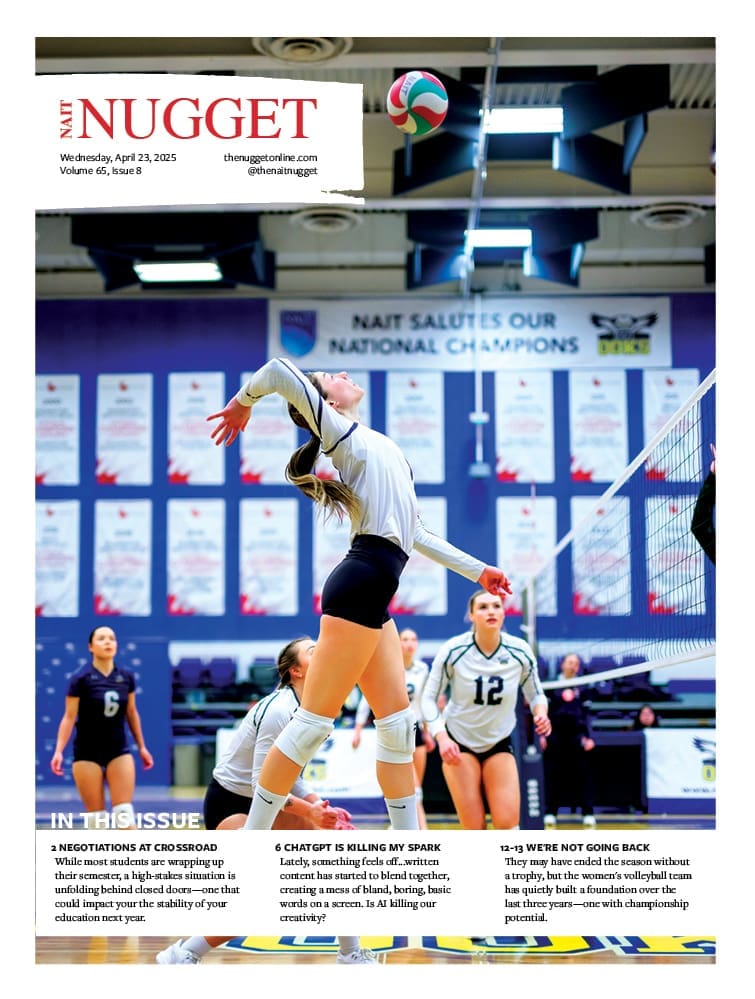Not everyone is lucky enough to combine their passion and their career, but one NAIT instructor has figured out how to do both. Kelly Shepherd, who teaches English Communications, is also an award-winning author with a newly released poetry book called “Dog and Moon.”
Shepherd launched his new poetry book at Audreys Books on March 11, with guest authors Chris Hutchinson, Su Kroll and Nancy Holmes. This is Shepherd’s third poetry collection; his second won the Robert Kroestch City of Edmonton Book Prize in 2019. He’s also a poetry editor for an environmental philosophy journal, a judge for the CLC poetry contest and has appeared at the Edmonton Poetry Festival multiple times.
Shepherd said that writing Dog and Moon was “very exciting, really big and was a lot of work.” Unlike conventional books, where it is easier to define what they are about, Shepherd explained that defining poetry is more challenging. “It is a whole bunch of different subjects, all kind of woven together.” Shepherd writes in the poetic style called Ghazal, an ancient method of writing with Urdu, Arabic and Indian roots, though he said his format is loose. “ I know there are lots of very traditional formal rules and I am actually breaking most of those,” he shared.

Shepherd’s inspiration to write poetry in this book tackles the question of creativity. While the main themes revolve around the title, he also said the book explores human relationships with the natural world and mythology.
“Where does creativity come from? Sort of the ancient idea of the muse,” said Shepherd. “You know when you are visited by the muse or something…I don’t believe in the muse as like this spirit that comes and visit you or something, but I don’t pretend to understand it exactly either. So, there’s lot of mythical and even mystical attempts to explain that, and that’s really interesting to me,” he said.
Balancing time between being an author and an instructor can be tough, and Shepherd laughed when he said that he does not do it very well. “Time management is everything at post-secondary, right? For students and for instructors, it is just busy. It is a busy job.”
However, Shepherd always carries a notebook, which he uses to compile ideas as they come. “I have for many years, and I always when I overhear something that is interesting, or you know whatever, something comes to my mind, I write little notes down and then later on, I compile them into Word documents…I am always working on it. Very lowkey.”
Moving forward, Shepherd has plans for more books and has another manuscript in progress but admits that it is a big process that involves a lot of rejection. “If you are lucky and you finally get accepted, then it is a huge process after that because there is editing, it takes them a long time to even get back to you…copyediting and a whole bunch of steps. So hopefully, I have many more books in the future.”
Even though he hopes to publish more, Shepherd has no plans to quit teaching. There are only a handful of famous Canadian writers that do not need a day job, he said. “I have been fortunate enough to actually win a prize for a poetry book in the past…that was actually a money prize. And that is a rare and wonderful thing in the world of poetry. But even that is not enough to make a living.”
Despite that, Shepherd did have some advice for aspiring authors, emphasizing reading and perseverance as necessary qualities. “You have to read a lot… you might get a lot of rejections before anything good happens.” Shepherd added that the willingness to be edited and humility are equally vital traits for budding writers. “Your writing isn’t precious. It is going to get vetted and go through levels of editorial.” Finally, Shepherd talked about making time for writing. “You have to carve out time to make that happen, no one will do it for you. Your timetable won’t be nice and say, ‘Here is a nice block of time every day at 11.’”






